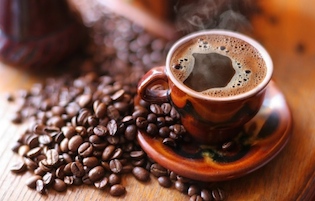Caffeine and endurance sports
Caffeine and endurance sports
the caffeine dehydration debate
Caffeine is a diuretic (causes urine production) and yet some studies have concluded that caffeine does NOT cause dehydration. These two statements would seem to contradict each other. Here’s what the studies actually say:

Mayo Clinic
“Drinking caffeine-containing beverages as part of a normal lifestyle doesn’t cause fluid loss in excess of the volume ingested.” (link to article)
WebMD
“Caffeine can make you need to urinate. However, the fluid you consume in caffeinated beverages tends to offset the effects of fluid loss when you urinate.” (link to article)
The National Library of Medicine
“published studies offers no support for the suggestion that consumption of caffeine-containing beverages as part of a normal lifestyle leads to fluid loss in excess of the volume ingested” (link to article)
The common theme is that caffeine makes you urinate, but not in excess of the volume ingested. In other words, you may be urinating out the fluid in the drink. This comes as no surprise to coffee drinkers. Simply translated, caffeine may be prohibiting the drink from hydrating you.
If that is the case it can be a problem for endurance athletes. What dehydrates you is the fact that you are training or competing in a grueling sport. Your sports drink (or water with your gel) is supposed to rehydrate you – that’s the whole point! Proper hydration is critical to performing your best as well as avoiding cramping and injuries.
caffeine and "energy"
Caffeine doesn’t provide energy, rather it’s a stimulant that causes you to exert energy. Your energy comes from your glycogen stores and the carbohydrates that you consume while training or competing. The stimulative effect of caffeine diminishes with subsequent doses (ie, you get a big “boost” from your first cup of coffee, and not so much from your 3rd cup later in the day). In an endurance event you don’t want to be exerting more energy than necessary early in the event, that’s a good way to run out of energy before the end.
Likewise, at the end of a long endurance event, you may be out of it mentally and physically and really in need of a “boost”. If you have been relying on caffeine since early on in the event, then you may not get the boost you are looking for at the end. But if you have been “caffeine free” for the duration of the event, then you will get the caffeine kick you are in need of near the end. In addition, if the caffeine is impacting your ability to remain hydrated, then by taking it near the end you will minimize the potential effects of dehydration – namely: degraded performance, cramping, injuries and increased recovery time.
Every athlete is different and needs to find out what works best for their own body, but in general for endurance athletes we recommend using caffeine toward the end of your event for the above reasons. In shorter events caffeine is often used since dehydration is less of a concern (depending on the duration).
e-Fuel and our original e-Gel contain no caffeine, so for those that prefer to train and compete caffeine free they are great options.
For those that want a caffeine stimulative boost we recently introduced e-Gel Turbo with 50 mg of caffeine.
if you found this useful please share!
related resources
gels, drinks, chews ... what's best for your sport?
Use our Sherpa Nutrition Guide tool to get your nutrition dialed in. Just plug in your sport, problems you’re having (cramping, stomach issues, running out of energy) and Sherpa will give you a detailed person guide. Free, quick and easy!
fat and protein during your race, don't do it!
In order to achieve optimum performance in any endurance sport you need to maximize oxygen delivery to the working muscles. What you eat plays a significant role.
fructose, you need some!
Fructose often gets a bad rap, but using it properly will actually give you an advantage, learn how.
why protein should NOT be in your sports drink
what about magnesium, calcium and other electrolytes?
e-Fuel. and e-Gel have the electrolytes sodium and potassium, but not magnesium, calcium and others. Read why
when to use sports drinks and energy gels and can they be used together
If you decide to use e-Gel and e-Fuel together (or any energy gel and sports drink), follow these guidelines for best results.
sports drinks: sugars vs complex carbs
how to mix e-Fuel
e-Fuel is designed to be a rapid mix powder that will fully dissolve, but here’s some tips to help make sure it mixes quick and easy with no clumping!
the marathon wall and how to avoid it
The bad news is that “the wall” is a very real thing. The good news is that you can avoid “hitting the wall” if you follow this advice.

